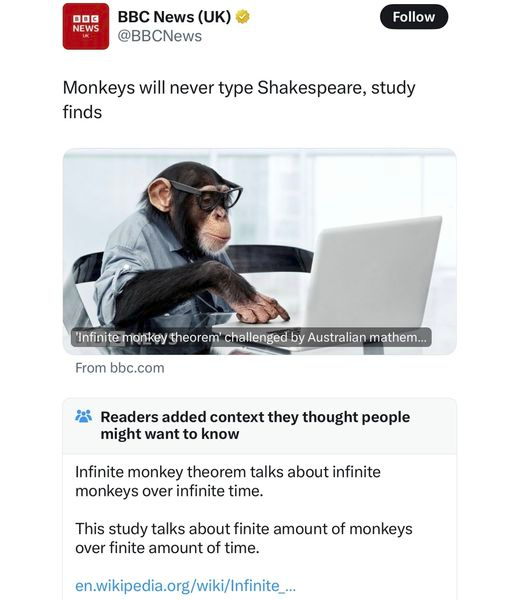this post was submitted on 03 Nov 2024
1145 points (98.6% liked)
Science Memes
12577 readers
2954 users here now
Welcome to c/science_memes @ Mander.xyz!
A place for majestic STEMLORD peacocking, as well as memes about the realities of working in a lab.

Rules
- Don't throw mud. Behave like an intellectual and remember the human.
- Keep it rooted (on topic).
- No spam.
- Infographics welcome, get schooled.
This is a science community. We use the Dawkins definition of meme.
Research Committee
Other Mander Communities
Science and Research
Biology and Life Sciences
- [email protected]
- [email protected]
- [email protected]
- [email protected]
- [email protected]
- [email protected]
- [email protected]
- [email protected]
- [email protected]
- [email protected]
- [email protected]
- [email protected]
- [email protected]
- [email protected]
- [email protected]
- [email protected]
- [email protected]
- [email protected]
- [email protected]
- [email protected]
- [email protected]
- [email protected]
- [email protected]
- [email protected]
- !reptiles and [email protected]
Physical Sciences
- [email protected]
- [email protected]
- [email protected]
- [email protected]
- [email protected]
- [email protected]
- [email protected]
- [email protected]
- [email protected]
Humanities and Social Sciences
Practical and Applied Sciences
- !exercise-and [email protected]
- [email protected]
- !self [email protected]
- [email protected]
- [email protected]
- [email protected]
Memes
Miscellaneous
founded 2 years ago
MODERATORS
you are viewing a single comment's thread
view the rest of the comments
view the rest of the comments

Fair enough, I suppose it is interesting!
In terms of the question, "Are there more infinite sequences that contain Hamlet or more that don’t?"- in the context of true randomness and truly infinite sequence, this feels like almost a trick question. Almost every truly random infinite sequence will contain Hamlet an infinite number of times, along with every other possible finite sequence (e.g., Moby Dick, War and Peace, you name it). In fact, the probability of a random infinite sequence not containing Hamlet is effectively zero.
Where it becomes truly interesting is if you have an infinite number of infinite sequences. Now you’d certainly get instances of those “effectively zero” cases, but only in ratios within infinity itself, haha. I guess that’s probably what you were getting at?
I thought that at first... But then for every infinite series with exactly one hamlet in it, there's an infinite series where one character is wrong. And there's another one where a different character is wrong... And so on and so on. Even if the series contains an infinite number of hamlets, you can replace one character in each in a huge number of ways! It starts to seem like there are more options with almost Hamlet than there are specifically with Hamlet.
In fact, I begin to wonder if almost any constraint reducing the search space in the infinite set of such infinite sequences, you will inevitably have fewer items within the search space than without... Since you can usually construct multiple non-matching candidates from any matching one.
But... Honestly I'm not sure how much any of that matters in infinite contexts. Since they are impossible it boggles my mind trying to imagine it.